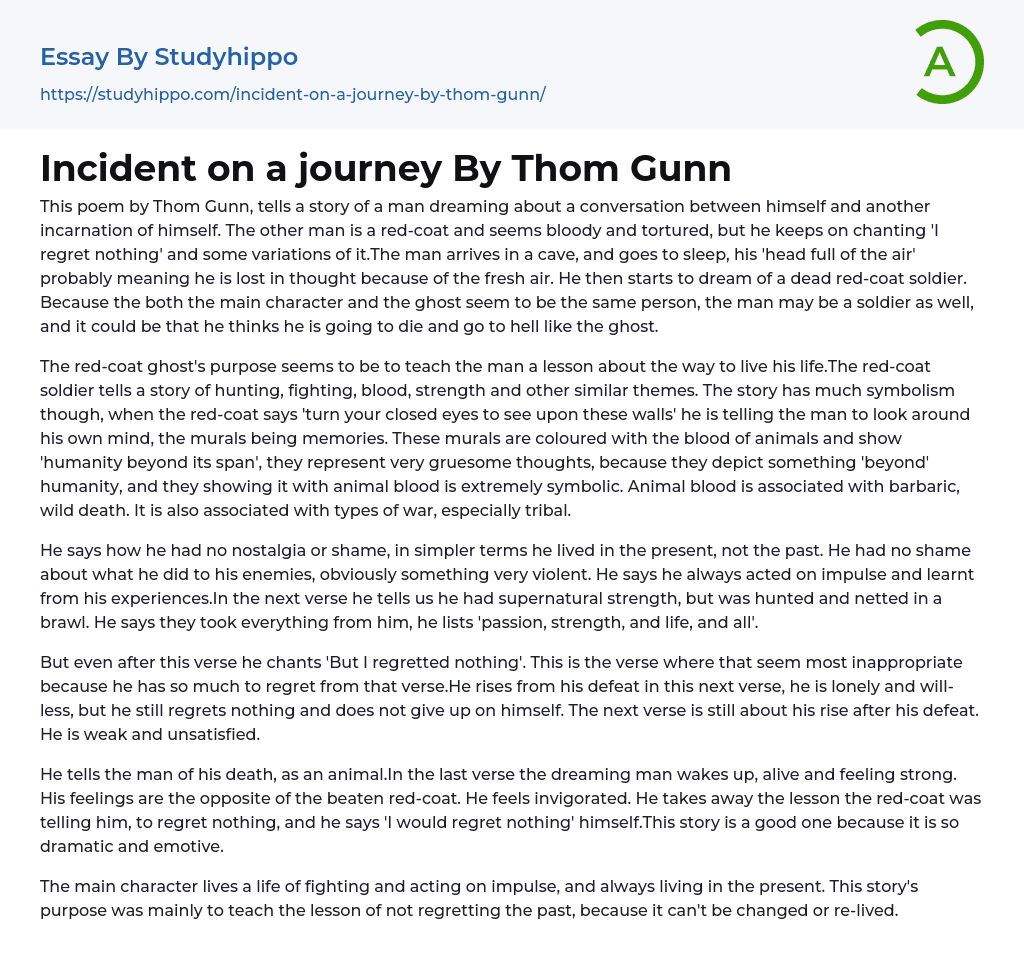This poem by Thom Gunn, tells a story of a man dreaming about a conversation between himself and another incarnation of himself. The other man is a red-coat and seems bloody and tortured, but he keeps on chanting 'I regret nothing' and some variations of it.The man arrives in a cave, and goes to sleep, his 'head full of the air' probably meaning he is lost in thought because of the fresh air. He then starts to dream of a dead red-coat soldier. Because the both the main character and the ghost seem to be the same person, the man may be a soldier as well, and it could be that he thinks he is going to die and go to hell like the ghost.
The red-coat ghost's purpose seems to be to teach the man a lesson about the way to live his life.The red-coat s
...oldier tells a story of hunting, fighting, blood, strength and other similar themes. The story has much symbolism though, when the red-coat says 'turn your closed eyes to see upon these walls' he is telling the man to look around his own mind, the murals being memories. These murals are coloured with the blood of animals and show 'humanity beyond its span', they represent very gruesome thoughts, because they depict something 'beyond' humanity, and they showing it with animal blood is extremely symbolic. Animal blood is associated with barbaric, wild death. It is also associated with types of war, especially tribal.
He says how he had no nostalgia or shame, in simpler terms he lived in the present, not the past. He had no shame about what he did to
his enemies, obviously something very violent. He says he always acted on impulse and learnt from his experiences.In the next verse he tells us he had supernatural strength, but was hunted and netted in a brawl. He says they took everything from him, he lists 'passion, strength, and life, and all'.
But even after this verse he chants 'But I regretted nothing'. This is the verse where that seem most inappropriate because he has so much to regret from that verse.He rises from his defeat in this next verse, he is lonely and will-less, but he still regrets nothing and does not give up on himself. The next verse is still about his rise after his defeat. He is weak and unsatisfied.
He tells the man of his death, as an animal.In the last verse the dreaming man wakes up, alive and feeling strong. His feelings are the opposite of the beaten red-coat. He feels invigorated. He takes away the lesson the red-coat was telling him, to regret nothing, and he says 'I would regret nothing' himself.This story is a good one because it is so dramatic and emotive.
The main character lives a life of fighting and acting on impulse, and always living in the present. This story's purpose was mainly to teach the lesson of not regretting the past, because it can't be changed or re-lived.
- Book Summary essays
- Metaphor essays
- Reader essays
- Rhyme essays
- Literary devices essays
- Villain essays
- Books essays
- Genre essays
- Literary Criticism essays
- Writer essays
- Protagonist essays
- Simile essays
- Poem essays
- Book Report essays
- Book Review essays
- Greek Mythology essays
- Plot essays
- Tragic Hero essays
- Coming of Age essays
- Play essays
- Rhetoric essays
- Rhetorical Question essays
- Translation essays
- Understanding essays
- Reason essays
- Character essays
- Letter essays
- American Literature essays
- Literature Review essays
- Utopia essays
- Poetry Analysis essays
- Dante's Inferno essays
- Between The World and Me essays
- Incidents in The Life of a Slave Girl essays
- Flowers for Algernon essays
- Myth essays
- Everyday Use essays
- Boo Radley essays
- Genesis essays
- Richard iii essays
- Alice in Wonderland essays
- On the road essays
- Ozymandias essays
- The Nightingale essays
- Holden Caulfield essays
- Animal Farm essays
- 1984 essays
- A Hanging essays
- Shooting An Elephant essays
- A Tale Of Two Cities essays




